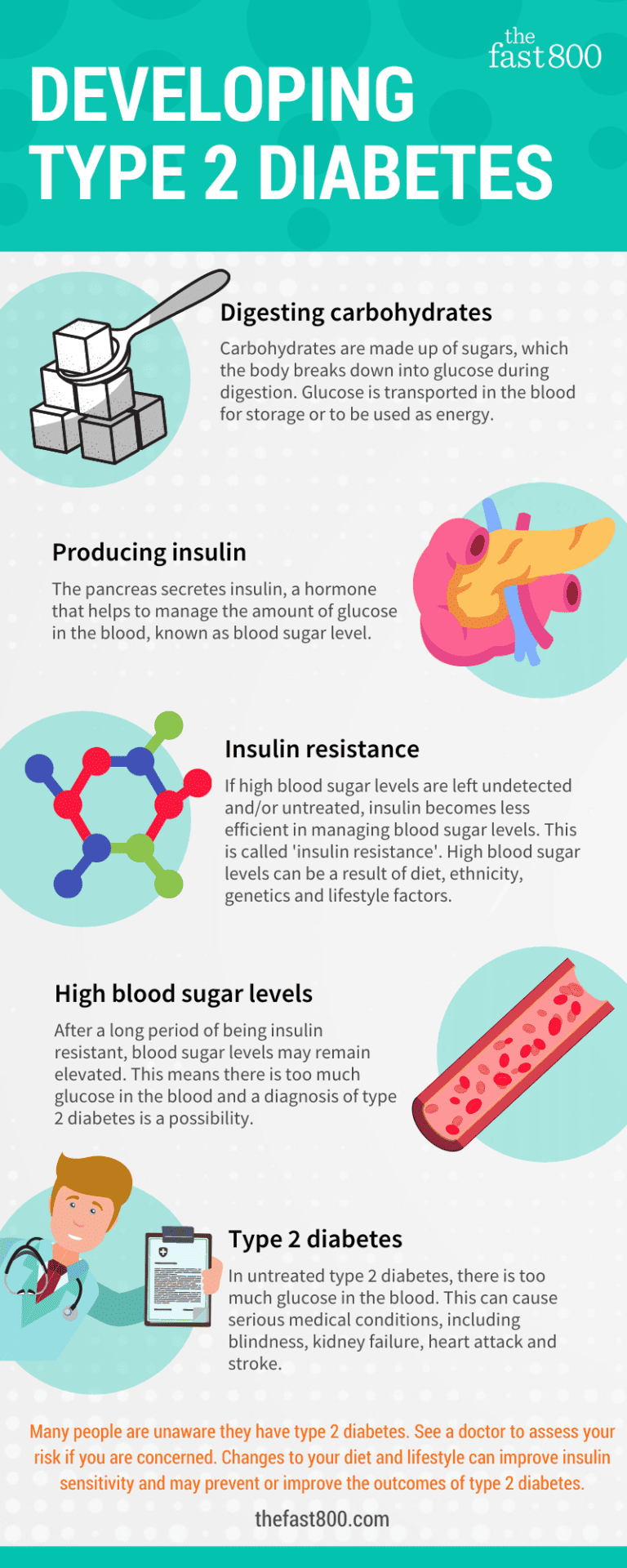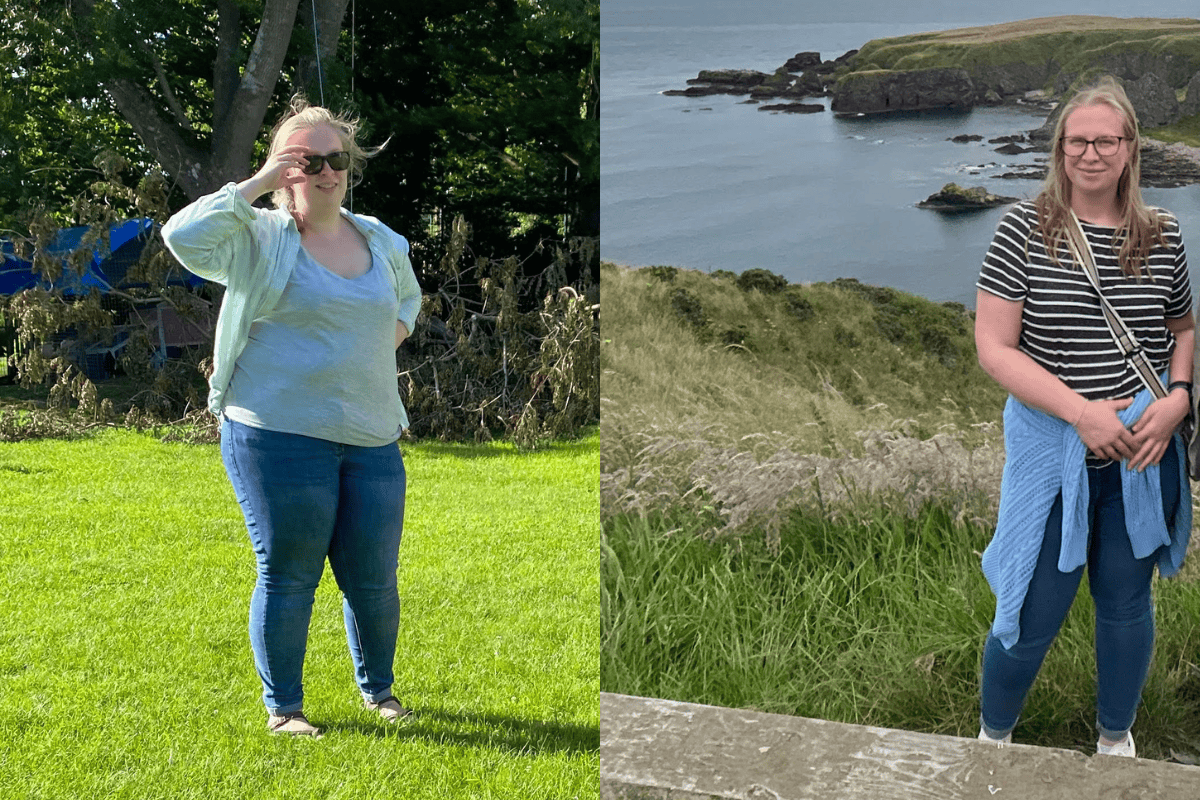What is diabetes?
Diabetes is a serious disease affecting a large number of populations around the world, with many unaware they have the condition. A study recognised that in the UK alone, half a million people (about one per cent of the population) were living with undiagnosed type 2 diabetes.1 This article has been written to offer the facts on diabetes – particularly pre-diabetes and type 2 diabetes – and provide further insight to what we have learned from the science.
There are two main types of diabetes: type 1 and type 2. About 90 per cent of those living with diabetes have type 2. While it can occur at any age, type 1 diabetes is typically diagnosed in children and young adults, and must be treated with insulin. Type 2 diabetes is more typically related to ageing, family history and unhealthy lifestyle factors. While it can be managed with medication, reversing type 2 diabetes with diet and lifestyle modifications is possible, as concluded by the DiRECT trial.
Type 1 diabetes
Type 1 diabetes occurs when the body cannot produce insulin. As a result, people with type 1 diabetes must inject insulin or use an insulin pump daily to manage blood sugar levels. Type 1 diabetes is fundamentally different to pre-diabetes and type 2 diabetes in its causes, pathophysiology and management. The Fast 800 is not suitable for those with type 1 diabetes. We recommend talking to your healthcare provider to determine how best to manage the condition.
Pre-diabetes
A pre-diabetes diagnosis occurs when your blood sugar level is considered higher than typical, but not yet at a level that earns a type 2 diabetes diagnosis. Pre-diabetes is effectively the warning bell for type 2 diabetes; left uncontrolled, pre-diabetes can progress and put you in danger of the risks associated with type 2 diabetes.
People who may be at risk of pre-diabetes include those who are:
-
- over 55 years old;
- overweight, particularly around the middle;
- not physically active;
- have metabolic syndrome; and/or
- immediately related to a type 2 diabetic.2
A 2014 study concluded one in three people in the UK had pre-diabetes,3 and were therefore at risk of going on to develop type 2 diabetes. Further, it is also recognised that two million Australians could be considered pre-diabetic.4 If you are worried about your risk or diagnosis of pre-diabetes, it’s best to discuss your concerns with your healthcare provider.
Making positive changes to your diet and lifestyle are great steps to take with or without a diagnosis, as they are unlikely to cause further harm and very likely to improve your overall health. The Fast 800 Programme is a safe way to take control of elevated blood sugar levels and lose weight for better health. The programme, which is now available on your desktop or app, provides nutritionist-developed meal plans with more than 700 moderately low-carb, Mediterranean-style recipes, plus evidence-based exercise plans and access to professionally-qualified Health Coaches to guide you in making a lifelong lifestyle improvement.
A personal trainer and nutritionist in the palm of your hand, ready when you are to support long-term weight loss. Get started today with our 7-day free trial and see how our Programme can support you on your journey to better health.
GET STARTED
Type 2 diabetes
When blood sugar concentrations become and remain elevated at very high levels over a number of years (when you may or may not have already received a pre-diabetes diagnosis), your body moves into a state of type 2 diabetes. When you digest carbohydrates, your body breaks them down into glucose, which is transported via blood around your body for use or storage. In response, your pancreas secretes the hormone insulin to manage where the glucose goes and how much remains in the blood. Its job is to prevent the blood from containing high levels of glucose, which over a significant period of time, will damage blood vessels and prevent blood from circulating effectively. With type 2 diabetes, insulin becomes less efficient at managing blood glucose levels and insulin resistance sets in. The pancreas continues to over-produce insulin, while also wearing itself out, reducing the number of insulin-producing cells by about half. If left untreated, individuals with type 2 diabetes can have too much blood glucose, and not enough insulin, which results in the disease progressing over time and increasing the risk of associated medical events.
Along with the risk factors of pre-diabetes, people are at a higher risk of getting type 2 diabetes if they:
-
- have a family history of diabetes;
- are over 45 years of age and are overweight or have high blood pressure;
- are over 35 years of age and have certain ethnic backgrounds; and/or
- are a woman who has given birth to a child over 4.5 kgs (9 lbs), or had gestational diabetes when pregnant, or had Polycystic Ovarian Syndrome.5

While some people living with type 2 diabetes may, dangerously, have no signs of the disease until complications arise, those at risk of type 2 diabetes should look out for these symptoms:
-
- regular excessive hunger and thirst;
- constant tiredness and lethargy;
- frequent urination;
- blurred vision;
- slow healing of cuts and bruises; and/or
- tingling sensation or numbness in hands and feet.6
Diabetes can only be diagnosed by a doctor ordering a blood test for HbA1c (haemoglobin A1c) to measure your blood sugar levels. If you are concerned, it’s important to speak to a healthcare professional.
What are the risks?
The risks of type 2 diabetes are not to be overlooked. Diabetes is the leading cause of blindness in working-age adults, and the leading cause of kidney failure. It can quadruple your existing risk of heart attack and stroke and in serious cases, result in limb amputation due to poor blood circulation.7 It is also associated with mental health conditions including anxiety and depression.
What we’ve learnt from the science
Remission, or reversing type 2 diabetes, is possible; the DiRECT Trial was pivotal in addressing type 2 diabetes using dietary interventions. The trial placed a group of volunteers with diabetes on a diet of 800 calories per day. After five months, almost half were no longer considered to have type 2 diabetes.8
Research suggests rapid weight loss is the most efficient method of reversing type 2 diabetes for those who are overweight. Adopting a moderately low-carb, Mediterranean-style diet alongside regular exercise is also a sound method to improve insulin sensitivity, blood sugar levels and reverse type 2 diabetes and pre-diabetes.9 Please note that you should always see your health care professional first, especially if you have been diagnosed with pre-diabetes or type 2 diabetes. For those that are suitable, The Fast 800 can help with weight loss and improved blood sugar management. Here’s some ideas on how The Fast 800 can help:
-
- The Fast 800 Programme: by joining the community of members, you will have access to meal plans developed using the science of diabetes management, exercise plans and daily support from our expert Health Coaches. The Programme is a step-by-step guide for those needing to lose weight for better health, or simply improve their overall health to reduce their risk of pre-diabetes, type 2 diabetes and their associated complications. Enjoy it on your desktop or take it on-the-go with our new app!
- If you have weight to lose, you may benefit from the rapid weight loss offered by The Very Fast 800 approach. On the Programme, our nutritionist has created 800-calorie daily meal plans that provide lots of flavour and variety while also looking after your nutritional requirements. By following a moderately low-carb, Mediterranean-style diet, we ensure you get adequate protein, healthy fats and fibre to ensure you don’t go hungry. After up to 12 weeks on The Very Fast 800, you will be guided in transitioning to long-term, sustainable approaches that use the same overarching philosophies to help keep you healthy.
- The Fast 800 Shakes: shakes can be an efficient way to keep your daily calories down during fasting, and are a useful kick-starter for those needing some quick, motivating results. The Fast 800 Shakes contain vital vitamins and minerals, lots of protein, fibre and healthy fats, without sacrificing quality. They contain only natural ingredients and no added sugar, so they’re healthy alternatives on busy days, though we recommend an intake of no more than two shakes per day (no more than ten per week) alongside a moderately low-carb, Mediterranean-style diet.
In summary
- Pre-diabetes and type 2 diabetes are associated with high blood sugar levels.
- Pre-diabetes can develop into type 2 diabetes if left untreated.
- Signs of higher risk include: being over 55 years old, being overweight especially if you are carrying excess weight around your middle, family history, high blood pressure and physical inactivity.
- Type 2 diabetes increases risk of medical events including blindness, heart attack, stroke and kidney failure.
- Making healthy modifications to your diet and lifestyle is a great way to prevent or or begin reversing type 2 diabetes.
- The Fast 800 Programme empowers you with the tools and resources for a long-term, healthy lifestyle to manage your risk.
The Fast 800 isn’t suitable for everyone, especially those people that are taking insulin, are underweight, are under 18, breastfeeding, pregnant, or type 1 diabetic. You should always speak to your healthcare provider if you are currently living with diabetes prior to making changes to your diet or lifestyle.
https://www.exeter.ac.uk/news/research/title_816274_en.html
https://www.diabetesaustralia.com.au/about-diabetes/pre-diabetes/
Mainous AG 3rd, Tanner RJ, Baker R, Zayas CE, Harle CA. Prevalence of prediabetes in England from 2003 to 2011: population-based, cross-sectional study. BMJ Open. 2014 Jun 9;4(6):e005002. doi: 10.1136/bmjopen-2014-005002. PMID: 24913327; PMCID: PMC4054625.
https://www.diabetesaustralia.com.au/about-diabetes/pre-diabetes/
https://www.diabetesaustralia.com.au/about-diabetes/type-2-diabetes/
https://www.thelancet.com/journals/lancet/article/PIIS0140-6736(17)33102-1/fulltext (The DiRECT Trial showed evidence reversing type 2 diabetes is possible with lifestyle changes).
Salas-Salvadó J, Bulló M, Babio N, Martínez-González MÁ, Ibarrola-Jurado N, Basora J, Estruch R, Covas MI, Corella D, Arós F, Ruiz-Gutiérrez V, Ros E; PREDIMED Study Investigators. Reduction in the incidence of type 2 diabetes with the Mediterranean diet: results of the PREDIMED-Reus nutrition intervention randomized trial. Diabetes Care. 2011 Jan;34(1):14-9. doi: 10.2337/dc10-1288. Epub 2010 Oct 7. Erratum in: Diabetes Care. 2018 Oct;41(10):2259-2260. PMID: 20929998; PMCID: PMC3005482.











